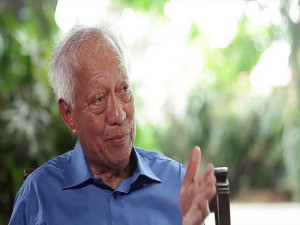MANILA — Opposing positions of the country’s top legal minds on the proposal to amend the 1987 Constitution made for “very substantial discussion” at the second Senate hearing on the measure, with some warning of its perils and others calling it an “essential” step.
Former Comelec Chair Christian Monsod, a member of the 1986 Constitutional Commission that crafted the current organic law, warned of pushing ahead with constitutional amendments, saying the country’s failures towards development should not be blamed on the law, but rather on shortcomings in its implementation.
“I submit that we have failed in development not because of the Constitution, but because we have not fully implemented it, especially its provisions on social justice and on local autonomy. The Constitution is not the problem, it is part of the solution,” Monsod told the hearing of the Senate committee on constitutional amendments and revision of codes.
“But how can the Constitution be properly implemented or even debated if there is pervasive ignorance of it? About 73% of our people admit to not knowing anything about it,” he told the committee chaired by Senate President Pro-Tempore Franklin Drilon.
He called the push for Charter change a “dangerous move,” noting how the administration was bent at steering the Constitution towards a shift to federalism, which might in turn serve to condone President Duterte’s “authoritarian ways of governing.”
“…[C]harter change towards authoritarianism, even if well meaning, imperils our democracy and should not be allowed to happen,” he said.
Former Supreme Court Chief Justice Hilario Davide Jr., also among the framers, likewise saw no need to make changes in the 30-year-old Constitution, saying it should instead be “honored, protected and defended until its provisions or some of it are proven to be ineffective, inadequate, insufficient or even irrelevant.”
“There is absolutely no need to amend or revise our 1987 Constitution of the Republic of the Philippines… Although perhaps imperfect as none is perfect except God, it is the best in the world,” Davide said.
“It is the only Constitution I know of which is Pro-God, Pro-Filipino, Pro-People, Pro-Poor, Pro-Life, Pro-Family, Pro-Marriage, Pro-Women, Pro-Youth, Pro-Environment. It contains sufficient provisions against abuse of power, and guarantees people’s active participation in governance, including the use of people power,” he added.
Davide is also against the federal shift, saying the system had “miserably lost” during the drafting of the Constitution as it “cannot fit” the country’s history, culture, traditions, character and
experiences.
“Just for the record, I fully believe, and therefore very respectfully submit, that the federal system of government is definitely not suited for our country and our people of this generation and even of the succeeding generations,” he said.
Former Supreme Court Associate Justice Adolfo Azcuna, also among those that crafted the Constitution, is meanwhile in favor of amendments, primarily for updating its “restrictive” economic provisions.
The Constitution’s economic provisions bar foreign ownership of corporations in the country, which several policy-makers see as limiting for the country’s growth potential.
Former Supreme Court Associate Justice Antonio Eduardo Nachura, meanwhile said it has become “essential” to amend the Constitution, as it has suffered from “infirmities” being a “compromise document” containing provisions that would only take effect as prescribed or defined by law, as opposed to self-executing.
He cited the Constitution’s “verbosity” and provisions on topics “that have no place in a Constitution, such as love, sports, and even advertising.”
Nachura also saw the need to revisit Constitutional provisions on the creation of a centralized government, the political party and electoral system, economic provisions, and powers of Constitutional commissions.
Drilon said the committee would weigh whether it would hold public hearings on Charter change outside Manila.
SFM
